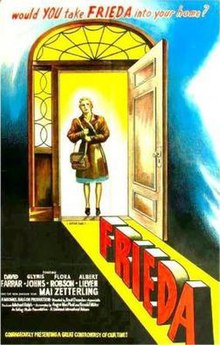Frieda (film)
| Frieda | |
|---|---|
 Theatrical release poster | |
| Directed by | Basil Dearden |
| Screenplay by | Angus MacPhail and Ronald Millar |
| Produced by | Michael Balcon |
| Starring | David Farrar Glynis Johns Flora Robson Albert Lieven Mai Zetterling |
| Cinematography | Gordon Dines |
| Edited by | Leslie Norman |
| Music by | John Greenwood |
Release date | 19 June 1947 (UK) |
Running time | 98 min |
| Country | United Kingdom |
| Language | English |
Frieda is a 1947 British film, directed by Basil Dearden, screenplay by Angus MacPhail and Ronald Millar and was produced by Michael Balcon.[1]
Synopsis
Frieda (Mai Zetterling) is a German woman who helps English airman Robert (David Farrar) to escape from a German prisoner-of-war camp as the Second World War nears its end. She loves him; he is only grateful to her. In a church between the Russian-German lines, however, Robert marries her, so that she can obtain a British passport. Together they eventually arrive in his Oxfordshire home. Frieda meets his family: his mother, his small stepbrother Tony, Judy (Glynis Johns), the attractive widow of Robert's brother, and Aunt Eleanor (Flora Robson), a figure in local politics and vehemently anti-German.
At first, the townspeople are bitterly hostile to Frieda, and Robert is forced to give up his job as a schoolteacher. Gradually, however, the ill will subsides, and she is accepted, except by Eleanor. Frieda is befriended by Judy, who, unknown to Robert, is now also in love with him. As Robert settles into a new life, working with Frieda on a farm, he begins to lose his prisoner-of-war heaviness. He sees Frieda in a new light. But then they see a film dealing with the horror of Bergen-Belsen and Frieda fears their marriage will not survive its revelation of her countrymen's cruelty. But Robert clings on to what they have established between them.
Suddenly, an ex-German soldier appears—Frieda's brother Richard (Albert Lieven). Thinking he had been killed, Frieda is initially overjoyed. He had been captured and allowed to volunteer for the Polish Army. However, she soon realizes that he has remained a Nazi at heart, his wedding present to Frieda being a swastika on a chain. In a pub, he is denounced as one of the guards at a concentration camp. To Robert, in private, he admits the truth of this accusation, and claims that Frieda had known and approved of his actions. They fight, and Robert now revolts against everything German as vile and polluted.
Frieda, fearing that she has lost Robert, attempts suicide, but, just in time, Robert reaches her and the shock brings him to a realisation of what he risked losing. He perceives that his faith in her was justified. Even Aunt Eleanor comes to believe that her sweeping anti-German prejudice was wrong: "You cannot treat human beings as though they were less than human—without becoming less than human yourself."[2]
Cast
- David Farrar as Robert
- Glynis Johns as Judy
- Mai Zetterling as Frieda
- Flora Robson as Aunt Eleanor
- Albert Lieven as Richard
- Barbara Everest as Mrs. Dawson
- Gladys Henson as Edith
- Ray Jackson as Tony
- Patrick Holt as Alan
- Garry Marsh as Beckwith
- Aubrey Mallalieu as Irvine
Reception
Box Office
The film was the ninth most popular movie at the British box office in 1947.[3][4]
Re-release
The film was re-released in 1948 to excellent box office results.[5]
References
- ^ "Frieda (1947)".
- ^ Daily Mail Film Award Annual 1948
- ^ James Mason 1947 Film Favourite The Irish Times 2 January 1948: 7.
- ^ Thumim, Janet. "The popular cash and culture in the postwar British cinema industry". Screen. Vol. 32, no. 3. p. 258.
- ^ "Variety (May 1948)". Variety. New York, NY: Variety Publishing Company. May 1948.
External links
- Frieda at IMDb
- Frieda at AllMovie
- Frieda at BFI Screenonline
- Review of film at Variety
